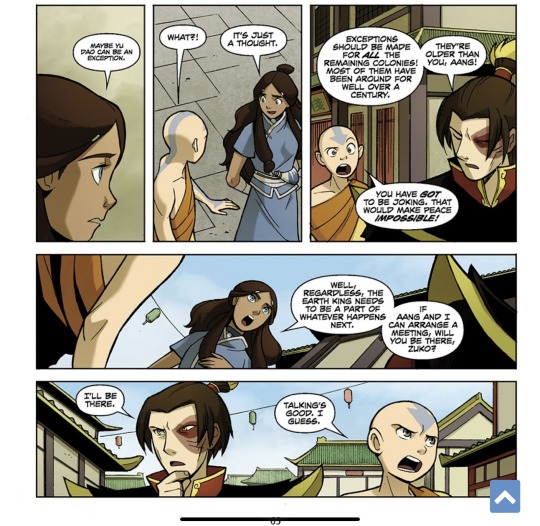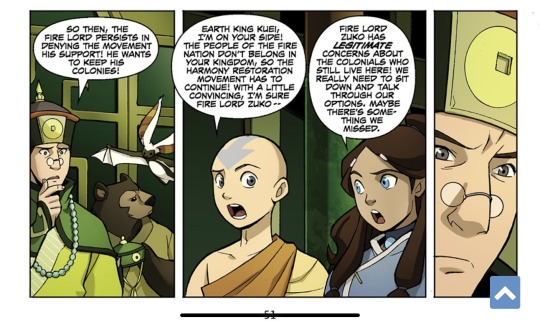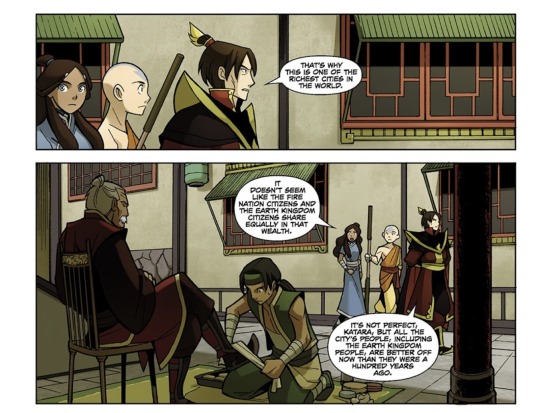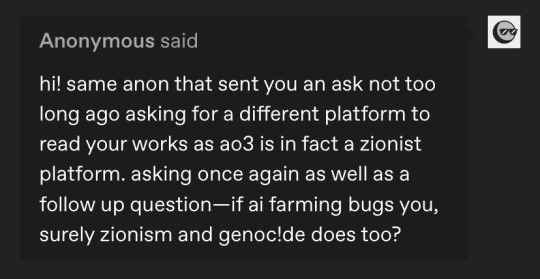#political hardball
Text
Movie Clips: The American President (1995)
.
Source:The Daily Press
If you’re someone whose a political junky such as myself and you love watching political movies and political documentaries, than The American President is a very good movie. Because its about a President who at the beginning of the movie is pretty popular and is going into to his reelection campaign having not finished his whole agenda that he ran on, trying to finish…

View On WordPress
#1995#America#Annette Bening#Democratic Party#Hardball Politics#Hollywood#Martin Sheen#Michael Douglas#Political Movies#President of the United States#Republican Party#Richard Dreyfuss#Romantic Comedies#Senate Republicans#The 1990s#The American President#The American President 1995 Movie#The American President Movie#The White House#U.S. Congress#U.S. Government#U.S. House of Representatives#U.S. Senate#United States#Washington#Washington DC
1 note
·
View note
Text
Katara would’ve been such a good diplomat (it’s canon)
everyone rightfully hates on the ATLA comics because the politics are baffling and the characterization is even more so…but if there’s one thing we can take away from the dumpster fire that is The Promise, it’s that Katara was BORN to be a diplomat and an international force for peace, okay? Especially since her besties, the Avatar and the Fire Lord, aren’t actually very good at this.
If you haven’t read The Promise, the Wikipedia summary is pretty good. The TL;DR is that Zuko and Kuei agree that the Fire Nation colonies need to be returned to the Earth Kingdom. The colony of Yu Dao is not happy about this because the people of the Fire Nation and the Earth Kingdom have been mixing together (under inequitable conditions) for more than a hundred years and “just kick out the Fire Nation” is not as straightforward as it seems, since there are blended families now. Zuko refuses to kick out the Fire Nation people from Yu Dao, Kuei wants to play hardball, and they almost launch another war. Oh and there’s a weird plot about Aang debating whether to put Zuko down like a rabid dog
For all that the Wiki page does a good job of summarizing the events, it forgets some key facts:
It’s Katara who first starts thinking about new solutions after witnessing the situation on the ground, and then comes up with the idea that Zuko and Kuei should meet and talk about the colonies:

It’s Katara who tells Kuei that Zuko has legitimate concerns (without saying that Zuko is right), when Aang tries to hedge and sugarcoat the truth:

And it’s Katara who says to Kuei, wait, what the hell do you mean that you have no idea what your people want, that Yu Dao is just a dot on the map for you? We’re getting you out of this stupid blimp and you’re gonna talk to people before you make a decision that affects their lives, you coward

To recap, Katara demonstrates some pretty freaking key political skills, like:
finding out what people want before making a decision for them
seeing people as people first and foremost, not as fire nation or earth kingdom
encouraging her loved ones, the Avatar and the Fire Lord, to resolve a conflict by beginning negotiations instead of brawling like a couple of drunks at a bar / kids on the playground (both analogies fit btw, 13-17 is a weird combination of ages)
realistically reporting tricky disagreements without sweeping them under the rug
kidnapping a king to the middle of a battlefield to give him a reality check about listening to the people he’s trying to rule
Anyway, Katara is hyper competent at both war AND peace! We see this in the show, with her compassion for the prisoners of the Earth Kingdom (by inciting a prison riot) and the suffering people of the Fire Nation (by committing ecoterrorism), only now that compassion is backed up not only by her fighting prowess and speeches about hope, but actual ability to manipulate the levers of power.
And have I mentioned that she has the ears of both the Avatar and the Fire Lord and her dad is Chief of the Southern Water Tribe? Even if Katara didn’t get a diplomat position based on her skills, or her status as a war hero, she could nepo baby her way in. The fact that she does not pick up a career in international diplomacy is a crime & a colossal oversight from the creators. At minimum you know Katara would’ve established Healers Without Borders or something. She deserves to be yelling at people at ATLA UN and then drafting world-changing resolutions.
And as a bonus, Katara demonstrates her gift for diplomacy by not smacking Zuko up the head for attempting to legitimize colonization through the argument of economic progress…

…and by not smacking Aang up the head for seriously considering anti-miscegenation as a viable political solution:

This patience is a new development because show!Katara did not have this in her, but maybe this is what growing up is all about and not just yet another strike on the “comics are wildly OOC” tally
TL;DR: ATLA boys lost their brain cells post-canon. All hail Katara, Sugar Queen of international diplomacy.
#Katara#Katara deserved better#atla comics#Chief Katara of the Water Tribes#United Republic Councilwoman Katara#Ambassador Katara#I’m not picky which one she becomes I just want her to exert political power as a principled and fair and compassionate representative#She saved the world it’s only fair she gets to run it especially since unlike most nepo babies (ie monarchy) she’s qualified#pro Katara#atla#my meta
169 notes
·
View notes
Note
do you have any response to people who treat voting like a trolley problem? because that seems to be where a lot of people here are coming at it from. like no faith in electoralism no care for the process, just a decision with a level of four bad and a level of five bad. to be clear thats not the way i come at it but i do think thats how many people think abt it
i mean the response is that, like, voting is not like the trolley problem because it happens more than once and not in a vacuum. it's more like... i don't know, one of those game theory games that unfolds across multiple play sessions. there will be a 2028 election and a 2032 election and the results of the previous elections will inform democratic party strategy, candidate selection, and policy in both of those. if you pledge to always support the democratic party as long as they're better than the republican party, then they can do 99.9% of what the republican party does without worrying about your unwavering support. if you have actual red lines (and this is you, as a bloc, as a group, individual political actions never matter) then the party will in fact think twice before crossing them about whether the hit to electoral support is worth it.
obviously, i'm a communist, i don't think you will ever get anything good out of the democratic party. bourgeois elections are ultimately choices of which representatives will repress you (that's some vintage marxist humour for ya). but if you think it's worth voting at all then you should also be aware of how your vote and the withdrawal thereof can be used to play chicken/hardball with political parties that need it. the right is well fucking aware of this--right-wing labour party members in the UK ran a huge sabotage campaign against the social democrat jeremy corbyn, losing the election and using that loss to oust all the left-wing elements of the party. the tea party have been using threats like this to push the republican party rightwards for decades now.
of course, you will never get something outside of the overton window of acceptable ruling-class politics by voting but if you believe there are meaningful gradations within that window (as, if you plan to ever vote at all, you logically must) then those concessions should still matter and should still be worth pursuing if you're already making the decisions to engage with electoral politics at all
183 notes
·
View notes
Text
The Manchin-Synematic Universe is over (if we want it)

I’m glad he did these things.
I wish he’d done more.
I wish he’d play hardball with Synema and Manchin (say, by loading up bills with pork for their states and then campaigning in person in their capitals to get voters to put pressure on their senators to back his play). I wish he’d campaign on packing the Supreme Court or putting term-limits on its judges (or both).
What we’ve learned from Biden v Rail Workers and Biden v Autoworkers is that if we make weaksauce compromises and other pizzaburgers politically unpalatable, Biden will respond. He may or may not care about principles, but he definitely cares about politics.
And delivering for the American people is good politics.
-What to do with the Democrats: They want to do it? Let's make them do it.


My next novel is The Lost Cause, a hopeful novel of the climate emergency. Amazon won't sell the audiobook, so I made my own and I'm pre-selling it on Kickstarter!
29 notes
·
View notes
Text
TBILISI, Georgia—Last December, the European Union granted Georgia candidate status for EU membership. Now the bloc is deeply at odds with Tbilisi after the ruling Georgian Dream party passed a controversial bill that has triggered protests in the streets of the capital and continuous violent clashes between demonstrators and the police, which has used tear gas, water cannons, and even rubber bullets, at times, to quash the protests. The EU is now preparing to use hardball tactics of its own in response.
The so-called foreign agents bill, which is strikingly similar to legislation introduced by Russia in 2012 to target critics of the Kremlin, will require all organizations that receive more than 20 percent of their funding from other countries to register with the Georgian Justice Ministry as agents of foreign influence. Georgia’s government defended the bill by arguing that it is needed to increase transparency, defend against “pseudo-liberal values” promoted by foreigners, and protect the country’s sovereignty. Georgian President Salome Zourabichvili, who announced on May 19 that she had vetoed it. But her decision can be overridden by another vote in parliament.
The government had backed down on the introduction of such a law in March 2023 after a substantially identical bill was likewise met by street protests and criticism from the EU. But after Europe subsequently expressed its favorable opinion on the country’s EU candidate status in December, the ruling party defiantly reintroduced the bill in April and passed it the following month despite the reiterated calls by the EU, the United States and other Western allies and international organizations to withdraw it—calls that have only gotten louder amid widespread acts of intimidation against media and members of civic groups.
The EU is treading a fine line on its opposition to the law. On the one hand, it cannot accept the legislation as it is because it is against the bloc’s core values and laws, by which Georgia has to abide in order to become a member. On the other, it cannot ignore the loud calls by Georgian civic groups, many of which are financed by European entities and see EU membership as the only hope for democratic progress in the country and keeping it from drifting away toward the Russian orbit. More than 80 percent of Georgians support membership to the EU, which is also enshrined as an ambition in the country’s constitution.
“The adoption of this law negatively impacts Georgia’s progress on the EU path. The choice on the way forward is in Georgia’s hands. We urge the Georgian authorities to withdraw the law, uphold their commitment to the EU path and advance the necessary reforms detailed in the 9 steps,” said Josep Borrell, the European Union’s foreign-policy chief, in a statement published the day after the approval of the bill.
Borrell added that the “EU stands with the Georgian people and their choice in favour of democracy and of Georgia’s European future. The intimidation, threats and physical assaults on civil society representatives, political leaders and journalists, as well as their families is unacceptable. We call on the Georgian authorities to investigate these documented acts.”
When the EU granted the candidate status to Georgia, it recommended that the country take nine steps toward reform, which include fighting disinformation and foreign information manipulation; improving alignment with the EU’s common foreign and security policy; addressing the issue of political polarization; ensuring a free, fair, and competitive electoral process; ensuring a systemic approach to de-oligarchization, and undertaking a holistic and effective judicial reform process.
“The EU stands ready to continue supporting Georgians working towards a European future,” Borrell’s statement concluded.
Many in Georgia’s civil society and opposition parties found the statement—which was issued only the day after the approval of the bill—to be weak, said Tinatin Japaridze, a Washington-based risk analyst at the Eurasia Group. “This makes the likelihood of any punitive measures, specifically sanctions from the EU, less likely in the immediate term,” Japaridze said. “I think we are going to watch Brussels try to take its time to figure out exactly how the situation evolves over the next few weeks and months.”
In contrast, the United States was much bolder. James O’Brien, the U.S. assistant secretary of state for European and Eurasian affairs, warned while visiting Tbilisi on May 14 that Washington could impose financial and travel restrictions unless the bill underwent change, or if security forces continued to forcibly broke up protests as they have in recent weeks.
“If the law goes forward without conforming to EU norms and this kind of rhetoric and aspersions against the U.S. and other partners continue, I think the relationship is at risk,” O’Brien said.
Japaridze said the perception in Washington is that the steady democratic backsliding and Georgian Dream’s recent rhetoric signaling the country’s reorientation away from the West may elicit stronger punitive measures from the United States, rather than the EU, in the near term.
“After the elections, depending on how the elections are held, whether they are free and fair, whether Georgian Dream tries to force its way into getting reelected and into staying in power, or if there is a peaceful regime change, I think the EU is going to make more bolder steps,” Japaridze added.
A top EU official who asked to remain anonymous said the most likely scenario is that in October, if the bill hasn’t been withdrawn, the European Commission will tell the Georgian government that it will not confirm the country’s candidate status, when it issues its yearly report on countries included in the accession process.
Toward the end of May, EU foreign ministers will meet and likely discuss potential reactions the bloc could take to the approval of the bill. “[I] reiterated my full support in continuing to help Georgians to work towards a European future, including by helping to find the best way to address legitimate concerns on all sides,” wrote European Council President Charles Michel on X after speaking to both the Georgian president and prime minister on May 15, the day after the bill was passed.
Several EU officials criticized the bloc for having been too soft so far, wishing it had taken a harsher position before the approval of the law. Now, many doubt that the bill could be withdrawn or be substantially changed in line with other Western countries’ legislation on foreign influence, such as those of the United States and France. They also point at other signs of an illiberal turn by Georgia’s government and its rapprochement with Russia.
For instance, Georgian Dream proposed a bill in March that would broadly curtail LGBTQ rights. It also passed controversial changes to the country’s tax code, which would make it easier to bring offshore assets to Georgia. Critics said the changes risked turning Georgia into a hub for black money while allowing Georgian Dream’s billionaire founder—Bidzina Ivanishvili, who made much of his fortune in Russia—and other oligarchs to evade potential Western sanctions.
Zourabichvili, the Georgian president, vetoed the so-called offshore law at the beginning of May, writing on X that she would “keep vetoing any bill that contradicts Georgia’s European and Euro-Atlantic aspirations. Georgia’s identity is European, unshakeable despite any attempts to distort it.” Prior to that, parliament also banned—with a bipartisan vote—mandatory gender quotas in politics, which prescribed that at least one out of every four persons on a party list must be a woman. The president vetoed this law too, but parliament overrode her decision on May 15.
“We need more public pressure otherwise the people on the streets in Georgia don’t feel understood. And I would say this a major mistake,” Viola von Cramon-Taubadel, a German European Parliament lawmaker from the Green/European Free Alliance coalition, told Foreign Policy. She said the EU should have threatened to sanction specific individuals in Tbilisi, such as those responsible for the crackdown of protesters and members of the Georgian Dream party—and in particular, Ivanishvili, its chairman.
“The government lied to us last year when they said they wouldn’t have tabled the bill again. The message to them has always been very clear,” the anonymous EU official said. “If we had been as radical as the U.S., what kind of signal would have been for the people of Georgia? That we are turning our back in a situation in which their only hope is the Union.”
Still, the perception by many of the activists who took to the streets to demonstrate over the past weeks, wrapped in European flags, is that the EU should have done more to prevent the democratic backsliding of the country.
“We really appreciated all the support and messages. But in terms of something visible, something you can touch, they have done nothing that can help, which is disappointing,” said Dachi Imedadze, a young campaign strategist for the Shame Movement, at the pro-EU integration civic group’s headquarters in an building in the old part of Tbilisi, equipped with traditional Georgian balconies, anti-tear gas masks, “Russia is an occupier” stickers, and other anti-Russia gear.
The protests, which have been increasing and intensifying in the country’s biggest cities after the passing of the law, are mainly driven by the country’s youth. Unlike older Georgians, some of whom retain a nostalgia for the Soviet Union, younger Georgians have fewer sentimental bonds to Russia and conceive the country’s future only within the EU.
“Georgia will have strong and independent institutions that will contribute to the democratization of the country. In addition, it will have improved social, economic and political programs,” said , a teacher and civil activist from Telavi, a small city in the wine-making region of Kakheti, where a large quantity of Georgian wine is still produced with the ancient method of fermenting and aging it in qvevris, or egg-shaped earthenware vessels.
For others, it’s more a black-or-white decision. “We don’t have the luxury to have an ideological debate here in Georgia. I don’t see Europe as any sort of utopian dream,” said Ana Tavadze, 26, an organizational development officer at the Shame Movement and a member of the pro-LGBT rights Tbilisi Pride group. “For us, the choice is between better or worse.”
9 notes
·
View notes
Note
What's up with the other regents not having any power? Are they also prisoners in the castle? What's the point of them sitting around voting if they can't actually have their own opinion?
So officially they do have power, Anon, but Ishido has two of them in his pocket, so at best the vote — if they're even bothering to vote any more — would be three to two.
After Toranaga resigned, Ishido couldn't find a candidate to fill his seat that all the other regents would agree on. Ishido's political game, I think we can all agree, is weak, and it is Ochiba (upon her return to Osaka) who tells him to start playing hardball, which involves putting the other regents and their families into protective custody (i.e. making them hostages) with the fictional plot against the heir as the pretext. (Toranaga's family, it seems, was already being held as prisoners, following his escape.) My understanding is that Ochiba was also the one to recommend Lord Ito to the open seat, which he accepts after all the flattery she and Ishido offer him at the theater performance. Lord Sugiyama resists all these power plays — he clearly resents the influence that Ochiba now seems to yield — and refuses to participate in any voting or acts of governance. He and his family also try to flee Osaka, but they're all massacred by Ishido and his men.
Sugiyama's open seat then is offered to Toranaga's half-brother, Saeki Nobutatsu, in exchange, I assume, for having turned against Toranaga and capturing him in Ajiro.
By Episode 9, Ishido is firmly in control of the regents: two of them he's essentially elevated to the regency and the other two are held as hostages (along with their families) in Osaka. It's unclear whether or not Kiyama and Ohno would support Ishido regardless of the hostage situation, although Kiyama ultimately refuses his role as Mariko's second, presumably because Ishido had pressured him to do so. What is clear is that the true power in Osaka is held by Ochiba, even though she holds no other title beyond mother of the Heir. At the meeting of the regents, she's there with the other men, sitting slightly behind Ichido, but hers is the dominant voice.
At this point, it's even a question if Ichido is even truly in charge of anything. Through her manipulations and machinations (and maybe even the murder of her dead husband's wife), Ochiba has become the unofficial authority. Ichido is simply the sword she wields to enact her vengeance against Toranaga — and against Mariko, both for the actions of her father and her continued loyalty to Toranaga.
#shōgun#shogun#shogun 2024#shogun fx#fx shogun#lady ochiba#ishido kazunari#ask and answer#anon asks#meta
10 notes
·
View notes
Text
In the first days of 2023, the reactionary and repulsive dynamic of American capitalist politics has been on full display.
For decades, the following process has played out time and time again: No matter how small its numerical presence, the far-right wing of the Republican Party dominates, the Democratic Party adapts in the name of “bipartisanship,” and its “left” flank capitulates without a fight in the name of “unity against the right.” As a result, the political axis of bourgeois politics moves to the right, and the process repeats itself. Each episode is more degrading than the last.
To socialists, this spectacle demonstrates that imperialism is reaction all down the line and that a movement of the working class is necessary to sweep both parties out of power and enact the revolutionary transformation of society.
To the Democratic Socialists of America, it is another opportunity to promote the tired fiction that the Democratic Party can be pushed to the left.
On January 7, Jacobin published an article by DSA member Neal Meyer entitled “The right played hardball in Congress. The left should take notes.”
As the title suggests, the article argues that socialists should pressure “progressive” congresspersons to “use the bully pulpit” and “fight” the Democratic Party leadership “just as hard as the right does against their leadership.” Meyer writes, “We should be prepared to go to war against Chuck Schumer, Hakeem Jeffries and others…”
Meyer asserts that this is the strategy of the DSA: “Democratic socialists use electoral politics and our position in legislatures to build our popular base,” “spread democratic socialist ideas” and “rally millions to a program of transformational change.”
As a preliminary matter, the DSA’s record in Congress is not rallying anyone for transformational change, except in the negative sense. The DSA’s representatives have used their electoral positions to illegalize railroad strikes, fund the Israeli military and provide the American military industrial complex with tens of billions of dollars to wage the US-NATO war against Russia, risking nuclear catastrophe.
Meyer papers over these votes, writing, “As Alexandria Ocasio-Cortez has said in the past, in any other country she would not be in the same party as Joe Biden. That has never been more clear than in the aftermath of Joe Biden’s decision to crush railroad workers’ right to strike to win paid leave.”
This is an unfortunate example, given the fact that Ocasio-Cortez and the rest of the DSA slate (save Rashida Tlaib) voted “to crush railroad workers’ right to strike to win paid leave.” There is a reason why Ocasio-Cortez and Biden are in the same party: The DSA plays a critical role in this sordid right-wing process, by trapping social opposition within the Democratic Party where it can be suffocated and eliminated.
Jacobin’s article is yet another example of this role. Meyer writes in a manner which makes clear the DSA is sensitive to the growing realization of the true role played by Ocasio-Cortez and her DSA cohorts. He presents the relationship between the DSA and the Democratic Party leadership as follows: “We ought to sit very uncomfortably inside the Democratic fold. It is, at best, a temporary and fraught marriage of necessity, one that we should want to exit as soon as possible.”
This is a falsification of the relationship between the DSA’s own congressional members and the Democratic leadership, as evidenced by the recent speakership fight. The DSA’s representatives unanimously voted for Democratic House Minority Leader Hakeem Jeffries on every round in last week’s leadership contest, despite Jeffries’ 2021 statement that “there will never be a moment where I bend the knee to hard-left democratic socialism.” In fact, Jeffries started a Political Action Committee (Team Blue) specifically to oppose left-wing challengers to Democratic incumbents. Even so, he won the votes of all those he is trying to unseat.
Alexandria Ocasio-Cortez, confronting growing left-wing opposition to her subservience to the Democratic Party, gave an explanation which was as revealing as it was pathetic. “I see some people say Dems should negotiate to get concessions,” she said in a social media post this week. “We do, but what we don’t do is bring them publicly in order to empower not just Republicans but the fascist flank of the Republican Party.”
This statement tracks with her record in Congress: The class struggle must be suppressed for the sake of the institutional security of the imperialist Democratic Party and the Biden administration. For this same reason Ocasio-Cortez and the DSA’s congressional representatives illegalized the rail strike and denounced left-wing criticism of Biden as “privileged” and racist.
In comments to MSNBC responding to the Republican speakership fight, Ocasio-Cortez confirmed the DSA’s role, saying, “What was important today was to send the message that we were united behind Hakeem Jeffries as the new minority leader, that there would be no defections, that Democrats are here, we’re not going anywhere.”
Undermining her own claim about the efficacy of secret negotiations, she pledged the Democratic Party would “stay 100 percent united” no matter what, adding, “We absolutely have differences,” but she is “willing to put that aside.”
Here, Ocasio-Cortez has accidentally told the truth. For the sake of the stability of the Democratic Party, the Democratic Socialists of America is willing to put aside its differences with the establishment, however minor they may be, by backing a party leader who has pledged to ignore them until he can remove them from Congress.
There is nothing unexpected or unusual in this behavior. Ocasio-Cortez and the rest of the DSA’s slate are not socialists, they are conformist politicians, and they are acting in conformity with the DSA’s political essence as a pro-imperialist faction of the Democratic Party.
The DSA exists not to extract reforms from the Democratic establishment, but to trap social opposition and channel it behind the Democratic Party. Only an organization with such a long practice in pseudo-socialist gymnastics could try to present Republican House Speaker Kevin McCarthy’s concessions to the far right as a rallying cry for reforming the two-party system from within.
#alexandria ocasio cortez#AOC#democrats#democratic socialists of america#class traitors#us politics#us political corruption
115 notes
·
View notes
Text
Long Distance: Peter Stone x Reader

Tagging: @plaidbooks @misscharlielulu @caracalwithchips @storiesofsvu @magic-multicolored-miracle @htariq @readingbookelf @cosmic-psychickitty @crazy4chickennuggets @im-just-a-mississippi-girl @1234-angelika @mysoulisasunflower @luckyladycreator2 @kabloswrld @xoxabs88xox @bport76
“You could come with me.” You whispered against Peter’s lips as you lay tangled up together beneath his sheets. His fingertips caressed the line of your jaw, his thumb chasing over the apple of your cheek as he looked into your eyes and spoke.
“You know that I can’t.”
New York was a step back for him. He had spent his whole life running from his father’s shadow, from the burdens the other man placed upon his shoulders. When he had moved to Chicago, he had been burying his childhood memories, reinventing himself. To go back would be undoing all of his hard work.
Choosing to be a prosecutor in Chicago felt like he was openly defying his father, an example of how the older man could have done better. He had always had a strong sense of justice, he wanted to prove that you didn’t have to play the politics, that there were other ways to help the people that needed it. His decisions were always focused on the law, he never shirked the guidelines and his conviction record spoke for itself. He played hardball in court, he knew that defence attorneys dreaded facing him because it meant they had to work harder, be smarter about their cases.
In the past you had told him that his dedication and fierce intelligence had been what attracted you to him in the first place. He didn’t settle for second best; he came out swinging from the get-go and you admired that. At the end of the day, he could hold his head high and say he had done his job to the best of his ability. He could sleep ay night knowing that, and on the nights that he couldn’t when the cases he lost haunted him…
He called you.
“I always like to check.” You whispered, your lips grazing across the corner of Peter’s mouth.
You didn’t make your desire for Peter to return to New York a secret, secrets had a way of festering, and you were always honest with him. You hoped that one day he would, but you didn’t apply any pressure, it was the way the relationship worked. Your career was important to you and Peter would never try to push you into moving to Chicago.
Peter watched as you slipped out from underneath the sheets and sauntered towards the bathroom. There wasn’t a part of you he didn’t adore, everything from the scars that adorned your skin to the freckle on your left ass cheek. You were confident in yourself, in your decisions, your choices and Peter craved that. It was one of the things that had attracted him to you in the first place. You didn’t give a shit what anybody else thought, you were true to yourself, and Peter craved that. He collapsed back into his pillows and stared at the ceiling as he heard the shower turn on. You were leaving in just a few hours, and he knew he would miss you fiercely. Maybe it was time to consider his options.
“Are you going to join me?” You called out from the bathroom.
Peter thought of you stepping underneath the heated water, your hands pushing your hair back away from your face as the water cascaded over your curves. He wanted this, he wanted to experience this each and every morning instead of snatched pieces of time over weekends, the two of you had off. Which, by the way, were becoming few and far between.
He stared at the closed bathroom door, and he knew he had to make a choice.
Love Peter Stone? Don’t miss any of his stories by joining the taglist here.
Like My Work? - Why Not Buy Me A Coffee
76 notes
·
View notes
Note
AO3 is a zionist website…is there any other way to read your work?

hi anon. i just saw the notification for your second ask, so allow me to clear the air on a few things.
1. i was unaware that AO3 is a zionist website, and after a quick google search I can only assume that you're referencing how an AO3 volunteer who was pro palestine was fired for making a pro palestine comment.
2. at this time, no, there is not another place to view my work. I am amenable to other options, if you would like to make suggestions for websites that allow nsfw work, will not sell my work to AI or attempt to monetize it, and will not bar me from writing in second person.
3. since it seems like you are trying to imply that i am a zionist for using AO3, allow me to also firmly state that no, I am not a zionist, and I'm appalled at the implication. Using a website that is run by people who apparently are does not make me a zionist. AO3 is a nonprofit organization; I do not donate to them, and they do not profit from my use of their website. Nor do their community guidelines force me to become a zionist, or force me to allow my work to be used for zionist purposes.
4. If we want to play hardball, tumblr's CEO is also a zionist, making tumblr also a zionist website.
5. I do not control which website managerial staff have certain political ideologies. I do not like the idea of AO3 being zionist, but they are currently the best option for keeping my work away from AI.
12 notes
·
View notes
Note
VOR: Nancy Pelosi as Dem caucus leader 2003-23, if you're not limiting it to heads of state.
A good question - its tough to answer because of the breadth, right? She gets points for being one of the people opposing the Iraq war in the buildup, but I guess that didn't work out, sigh. So overall I would say pretty good - so the point of a caucus leader, is almost to be the median, right? Its an execution job, not an ideology-shifting job, so its really all about the details of that execution.
I would say that the defining arc of her job has been decaying norms around governance and growing radicalism from the Republican party around tactics we can call "legislative terrorism" - something dems occasionally do too but 90%+ of this trend has imo been Republican led. I think this radicalism caught a lot of dems by surprise at first, and they failed to compensate & appreciate the threat. I would say a lot of Obama's first term, with his tenuous majorities in both houses, was underutilized, and once they lost it these tactics took their toll - but hard to blame Pelosi for that, she did the whole "100 Hours" plan of passing a spate of bills that all died in the Senate. Still, I think its fair to say, key dem strategist, by the time you get Merrick Garland being blocked from the Supreme Court the Dems had been dropping the ball and she is a part of that.
But that picked up heavily after that, particularly under Trump - I think she has positive VOR starting then in pushing the democrats into playing more serious hardball and being more practical on electoral politics. A lot of democrats to this day still hesitate on that, not understanding where you can compromise and where you can't (Secret Congress can get shit done). She knows and deserves credit for that.
So weaker first half, stronger second - I would give her a C+.
11 notes
·
View notes
Text
Russia-Ukraine Daily Briefing
🇷🇺 🇺🇦 Tuesday Briefing:
- EU FMs agree on transferring profits from frozen Russian assets to Ukraine
- New sanctions on Russian diamonds will change the global trade in gems
- Slovak PM to visit Ukraine amid strained ties
- Belgium to give Ukraine €611M in military aid in 2024
- Poland and Ukraine pledge quick end to political friction
- EU ready to play hardball with Hungary over blocked Ukraine aid
- Apple pays $13.7M Russian fine
- UK eases travel warning for parts of western Ukraine
- Ukraine war drives shift in Russian nuclear thinking
- Operations at damaged Russian fuel complex seen resuming within weeks
-----------------------------
📨 Daily newsletter: https://russia-ukraine-newsletter.beehiiv.com/
💬 Telegram: https://t.me/russiaukrainedaily
Socials: https://linktr.ee/rvps2001

#russia ukraine war#ukraine russia war#ukraine war#russian army#russian war crimes#news#newsletter#russia#ukraine
8 notes
·
View notes
Note
On ur post abt how the promise showed katara flexing her- frankly amazing- diplomatic skills: How do you think they could have handled the Yu Dao story better if they'd ended the show with platonic kata.ang/ future zk endgame in mind??
Just since it's quite an interesting plot to explore, and katara has some good moments, but I think it got drowned by weird (ooc) writing choices. Zuko and Aang get hit by the idiot ball hard. Obviously there's the whole 'promise' drama (as if half the finale wasn't dedicated to aang refusing to kill a firelord under any circumstances), but also kata.ang moments like the Avatar-state talk down + katara's vision; not to mention the bits where they undermine zk's canon friendship (the infamous 'ur hurting me' panel and katara agreeing with /encouraging the promise at all.)
this is a great question and this made me think of one of my favourite ZK fics, Refraction by caroe3725, which has a great re- interpretation of Yu Dao!
I think if Katara was with Zuko even just as a trusted friend, he never would have been going to Ozai, which means the conflict would not have escalated to the extent where Zuko decides to play hardball and Kuei retaliates. Katara would have supported his pov that families shouldn’t be separated, while also being adamant that Earth Kingdom citizens deserve to not be second class citizens in their own home.
the biggest issue with the titular promise is that it puts them all in a situation where they’re fretting about whether to kill their friend, instead of the actual difficult question of how to be fair to the citizens of Yu Dao without forcibly separating families that now don’t belong in either FN or the EK. I imagine Katara still playing a mediator role between Zuko and Aang, but not in a way where she’s like…preventing a brawl. Instead, she would be leading negotiations on how to restructure the town so that the Fire Nation is no longer at the top of the hierarchy. I think it would likely still end with Yu Dao independence, but with a greater emphasis on Katara’s first reaction to Yu Dao (that there’s serious wealth inequality) and how the FN can be responsible for remediating it, probably in the form of reparations for social programs. Certainly that would make it into a boring political comic, but I happen to find that interesting!
32 notes
·
View notes
Text
Interviews with nearly two dozen lobbyists, political consultants and lawmakers revealed that DeSantis’ struggles as a presidential candidate have already eroded his influence in Florida. There is a widespread expectation that his candidacy will end in failure. His standing at home may depend on how long he slogs forward in the presidential campaign — and how he will manage his exit from the race if he eventually drops out.
Now, it may be just a matter of time before Florida Republicans, once unflinchingly loyal, seek distance from DeSantis and his hardball governing methods.
State Rep. Daniel Perez, the Miami Republican in line to become the next state House speaker, urged his GOP colleagues this week to move more carefully in the future, saying that “the problem with wielding the power of government like a hammer is that the people start looking like nails.”
Perez insisted his comment was not a “message to the governor,” but added, “That being said, the Legislature can’t work alone, the Legislature works with the governor.”
And no matter how he framed his comments, Perez’s words were being viewed as a rejoinder to DeSantis. One Tallahassee lobbyist said it was a signal that the “conveyor belt” Legislature that passed whatever DeSantis wanted is coming to an end.
12 notes
·
View notes
Text
" If Israel remains unwilling to grant the Palestinians a viable state—or if it tries to impose an unjust solution unilaterally—then the United States should curtail its economic and military support. It should do so not because it bears Israel any ill will but because it recognizes that the occupation is bad for the United States and contrary to America's political values. Consistent with the strategy of offshore balancing, the United States would base its actions on its own self-interest rather than adhere to a blind allegiance to an uncooperative partner. In effect, the United States should give Israel a choice: end its self-defeating occupation of the West Bank and Gaza and remain a close U.S. ally, or remain a colonial power on its own.
This step is not as radical as it might sound: the United States would simply be dealing with Israel the same way that it has dealt with other colonial democracies in the past. For example, the United States pushed Britain and France to give up their colonial empires in the early years of the Cold War and forced them (and Israel) to withdraw from Egyptian territory following the 1956 Suez War. The United States has also played hardball with plenty of other countries—including close allies like Japan, Germany, and South Korea—when it was in its interest do so. […] public opinion polls confirm that the American people would support a president who took a harder line toward Israel, if doing so were necessary to achieve a just and enduring peace.
This policy would undoubtedly be anathema to most—though perhaps not all—elements in the lobby and it would probably anger some other Americans as well. "
John J. Mearsheimer, Stephen M. Walt, The Israel Lobby and U.S. Foreign Policy; Farrar, Straus and Giroux Editions, N.Y., 2007, pages 344-345.
#John J. Mearsheimer#Stephen M. Walt#Middle East#politics#The Israel Lobby and U.S. Foreign Policy#Israel#Palestine#Occupied Territories#Palestinians#ethnic cleansing#peace#two-state solution#militarism#jewish people#Israeli Arabs#crimes against humanity#democracy#Zionism#American Israel lobby#apartheid#Zionists#Cisgiordania#Palestinian territories#Gaza strip#West Bank#segregation#human rights violation#Palestinian refugees#nationalism#colonialism
3 notes
·
View notes
Text
oh lookie

Remember how I said I wasn't worried, because this was a demographic test? Even before it aired and I knew we'd come in low? Because Nexstar is well aware? There's a reason this is being scheduled early and announced early.
What this shows is:
AA/Southern College demo: secure
Walker's conservative/rural demo--well, not SECURE in its numbers but they know where it's at now at large
Winchesters floats similar numbers in the midwest as Walker without the largest liberal TV markets. Which, basically tells them, this is indeed your east coast conservative market. I do imagine Demetria's demographic also played a hand in Winchester's remaining numbers, out of Atlanta and related culture and interest centers. south east coast still turned up, but we'd like to have those seven million viewers up north back please.
no wonder verizon is trying to fuckin hardball nexstar. I checked the numbers. this actually isn't nexstar's fault. they've raised numbers under market average over the years, not above. Global reports don't pick sides on this. Verizon is punching where it hurts and it knows it, especially with the importance of startups of shows and their first three episodes.
But that won't be taken out on Winchesters itself in retaliation. It just means everyone knows where the moneybags are right now and someone's taking a contract term renegotiation opportunity. because in the meantime they're losing ad sales and that's uber duber devastating right in political season too because that's where the big ad buys are. trust me, i worked in that shit too.
39 notes
·
View notes
Text
Performative Brinksmanship is Obviously Stupid from the Outside
The farce that is the GOP House leadership fight continues, as Rep. Kevin McCarthy (R-CA) has just lost the eleventh ballot for speaker in the face of a small but entrenched far-right rebellion. The knot of far-right extremists who refuse to back McCarthy has led to chaos in the GOP, with no signs of a compromise being reached. Ringleader Rep. Matt Gaetz (R-FL) has even indicated that he'd be fine if the fallout of his putsch results in Democratic leader Hakeem Jeffries (D-NY) ascending to the speaker position (though if a compromise is reached with Democrats to thwart the right-wing rebellion, I suspect it will not involve Jeffries as speaker).
For the most part, pretty much everyone on the left-side of the political spectrum has been content to sit back, munch on popcorn, and watch the GOP eat itself alive. Democrats are enjoying making a show of unity against GOP irresponsibility; meanwhile, Republicans are literally arguing that their decision to cripple the House doesn't matter because if a real crisis occurs President Biden will be there to set things right (the infantilization of the American right continues apace). The whole thing is one ongoing trainwreck for the GOP, and I absolutely agree with what I take to be the Democratic Party conventional wisdom that we need not lift a finger to bail out the GOP unless we get some superb concessions for our trouble.
So here's my question for the peanut gallery. I'm sure the arson caucus of the GOP has its boosters among other far-right extremists. But is there anybody on the left side of the spectrum observing what's happening here and thinking "I may not agree with their policies, but this is a savvy play by Gaetz and co."? Does anybody think this sort of performative brinksmanship is smart politics?
It doesn't seem so to me -- progressives right now are laughing our heads off at a GOP in complete disarray, and rightfully so. We're not jealous of the far-right for having the gumption to take a stand; we see just how catastrophic this whole farce is for the conservative agenda (and thank god for that!).
So perhaps there's a lesson to be learned here. Thankfully, there are few if any Democratic equivalents to the bomb throwers currently making chaos in the House. Even our far-left members so far have known when to rein it in -- a quality which sometimes yields loud cries of "betrayal!" and "spineless!" from certain corners of the commentariat. I might suggest that next time such an instinct comes over you, you remember this moment. Remember how you didn't look across the aisle and marvel at the steely-eyed rebels who stood their ground and played hardball. Remember how what you actually saw was a bunch of children embarrassing themselves and self-sabotaging for their own self-aggrandizement. And then remember that it's probably a bad idea for Democratic progressives to emulate the GOP's dumbest members' most nihilist strategies.
via The Debate Link https://ift.tt/FOT85hn
23 notes
·
View notes